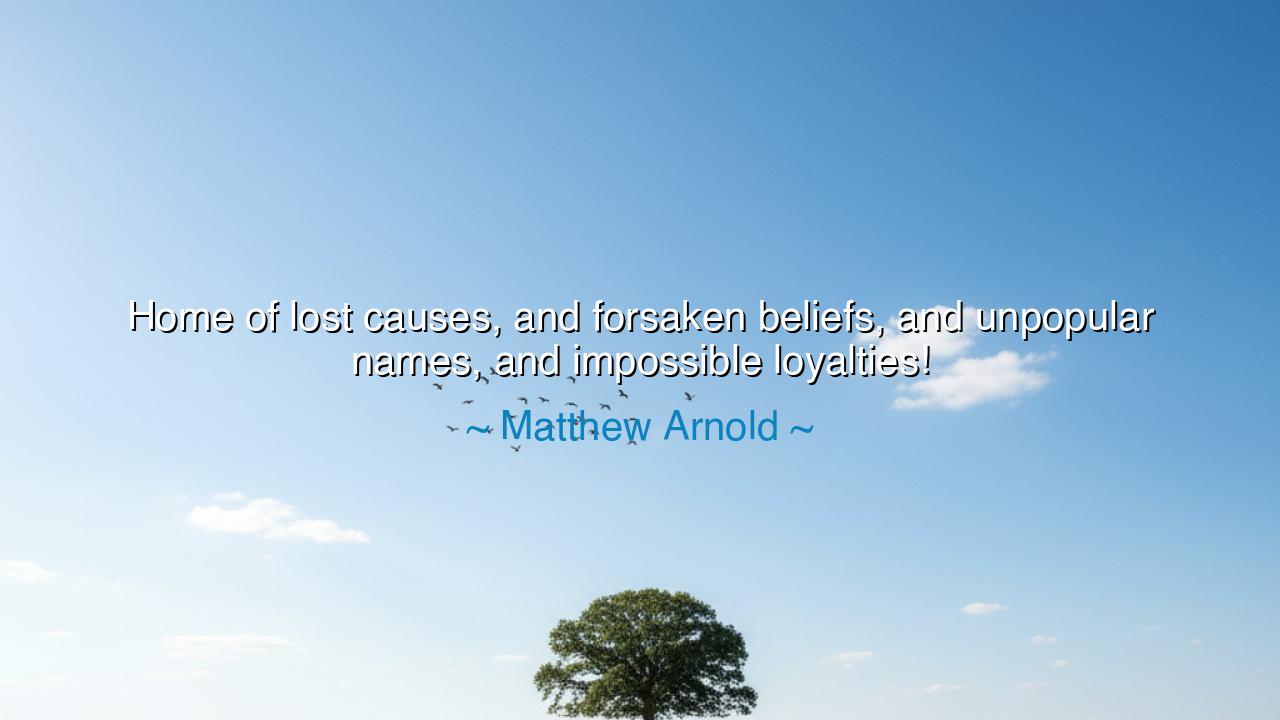
Home of lost causes, and forsaken beliefs, and unpopular names
Home of lost causes, and forsaken beliefs, and unpopular names, and impossible loyalties!






The immortal words of Matthew Arnold — “Home of lost causes, and forsaken beliefs, and unpopular names, and impossible loyalties!” — resound like a hymn of mourning and glory for a nation and a spirit that refuses to yield. They were written of England, in his great poem Rugby Chapel, but they reach far beyond time and place. They speak to the heart of every people who have ever stood steadfast for principles long out of favor, to every soul who has chosen truth over convenience, and loyalty over safety. Arnold saw that within the soil of tradition and struggle lies a sacred paradox: that greatness is often born not in triumph, but in the endurance of defeat.
Matthew Arnold lived in the nineteenth century, an age when the British Empire was ascendant, yet its soul was restless. He was a poet, a scholar, and a critic who looked beyond the splendor of his nation’s power to the deeper moral and spiritual health of its people. The line appears in his elegy to his father, Rugby Chapel, where he praises the older generation — men of faith, labor, and conviction — who held to their ideals even as the world around them changed. To Arnold, England was not merely a land of conquest or intellect; it was the home of principles — even those abandoned by others. It was the refuge of those who clung to their causes, though those causes seemed doomed. In this, Arnold found both sorrow and reverence — for he knew that the torch of faith often burns brightest in darkness.
To speak of the “home of lost causes” is to speak of the dignity of perseverance. The “lost cause” is not merely a failure, but a testament to conviction — to stand for what is right even when the world declares it wrong. History is shaped by such souls: those who were ridiculed in their age, yet vindicated in time. The forsaken beliefs are the truths that civilization abandons in its arrogance — the belief in honor, in mercy, in spiritual duty — cast aside for material progress. The unpopular names are the prophets, reformers, and martyrs who dared to speak before the world was ready to hear them. And the impossible loyalties are the loves and allegiances that cannot be explained by reason — the loyalty to conscience, to homeland, to faith, to ideals that outlive the flesh.
Consider the story of Sir Thomas More, the English statesman who stood against King Henry VIII’s will, refusing to betray his conscience even when it cost him his life. In his time, he was condemned as obstinate, clinging to a forsaken belief — the authority of the Church above the throne. Yet centuries later, he was remembered as a saint of integrity, a man who remained loyal to the truth when truth had no worldly power. More’s courage embodies Arnold’s cry: that England — and indeed, every land that cherishes the soul over success — must remain the home of impossible loyalties, where the heart remains steadfast even when the mind despairs.
But Arnold’s lament is also a warning. For he saw that the modern age, with its hunger for progress and comfort, was forgetting the nobility of sacrifice. A people who forsake their unpopular names and their lost causes in the pursuit of convenience lose the essence of what makes them great. For every civilization is measured not by its victories, but by what it dares to defend when defeat is certain. The ancients knew this: the Spartans at Thermopylae, the Jews of Masada, the rebels of every generation who stood upon the edge of ruin and refused to yield. Their causes may have perished in fire and dust, but their courage became eternal.
Yet there is no despair in Arnold’s words — only solemn pride. He calls us to revere those who stand apart, who live by principles the world calls obsolete. Such people are the keepers of civilization’s flame. When he says “home,” he does not mean merely England, but the inner homeland of the spirit — that sacred ground where conviction, compassion, and conscience dwell. To make one’s soul a home for lost causes is to make it a refuge for integrity. It is to say: “I will not abandon what is right because it is unfashionable, nor cease to love what is noble because it is impractical.”
So, my children, take this teaching to heart: cherish your lost causes, for they are often the cradle of truth. Stand firm in your forsaken beliefs when they are rooted in goodness; honor the unpopular names who spoke truth in their time; and hold fast to your impossible loyalties — to justice, to love, to the divine within you. For though the world may mock and the age may pass you by, your steadfastness will plant the seeds of renewal. The kingdoms of power will crumble, but the spirit of conviction endures. And in that endurance, you too shall become the dwelling place of what Matthew Arnold saw and revered — the eternal home of lost causes, where faith lives on when all else is forgotten.






AAdministratorAdministrator
Welcome, honored guests. Please leave a comment, we will respond soon